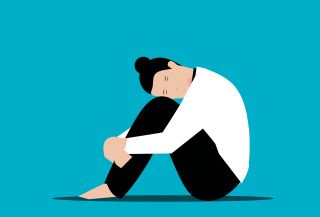Introversion
Do Introverts Take More Naps?
Introverts often feel the need to withdraw in order to recharge their batteries.
Posted August 1, 2023 Reviewed by Ray Parker
Key points
- The public often misunderstands what it means to be an introvert or extravert.
- Research has found several cognitive benefits of taking a nap.
- Introverts often report needing "downtime" or a nap after being overly socially stimulated.

A common question that comes up as individuals get to know each other is, "Are you an introvert or an extrovert?"
That such a question comes up makes sense given that one's identity as an introvert or extrovert is fundamental to who that individual is, underlying many of the individual's personality characteristics and needs. The public's understanding of the actual meaning of introversion or extraversion is another matter, as some mistakenly believe that this factor relates to how shy or, alternatively, how outgoing a person is.
What Defines an Introvert or Extravert?
What makes a person an introvert or an extrovert is not related to how socially gifted they are or how adept they are at making new friends. Instead, the root of the issue relates to how one derives their energy to operate in the world around them.
An introvert seeks a large amount of time where they can be on their own and disengage from immediate social connections, while an extrovert seeks a large amount of time in connection with others. Put another way, introverts love and need a fair amount of alone time, while extroverts need a fair amount of time with others. Introverts recharge their psychological resources or proverbial batteries in their quiet time, while what feeds an extrovert and gives them energy is time spent actively engaging with others.
Do Introverts Hate Parties and Extroverts Love Them?
The myth that introverts are shy extends to men, who may feel out of place and dislike social gatherings or parties; this notion is not true. Introverts can enjoy and even thrive at a party. They may enjoy conversation with a large or small group, or in a one-on-one conversation, and they may be gregarious and charming throughout the experience.
What's key to introversion, however, is the introvert also looks forward to the end of the party when they can return to a quiet setting and withdraw into the realm of their own independent psychological resources. Introverts' needs aren't so extreme that they need to be romantically single, as this identity has nothing to do with one's romantic capacities.
Introverts may be fine with spending quiet time in the physical company of another or others, but they do need to retreat within that space into a book, journal, television, or something else on which they can focus on their own.
Conversely, it's fair to suggest that extroverts love a party. Further, extroverts are often happy spending a long time at a party or spending hours actively engaged in social connection with others. Why is this so?
Extroverts do not need a lot of alone time, and if they have too much alone time, they start to feel low in energy and may even notice an impact on their mood. For instance, they may experience irritable or depressed moods, or they may present restless energy.
Brief Statistics on Napping
To consider whether introverts seek refuge in napping more than others, it's first important to consider some basic statistics on napping. According to a 2009 report by the Pew Research Center, a third of U.S. adults nap on any given day.
In terms of the benefits of napping, a substantial literature review found that naps have multiple benefits, including improved thinking (logical reasoning) and reaction time. Research by Lovato and Lack (2010) also supports that napping can improve cognitive functioning and help boost productivity.
What Does Napping Have to Do With Introverts or Extroverts?
Introverts, who are often processing a lot of information in their environment, can get drained and overstimulated easily. As a result, it makes sense that an individual who can get overstimulated seeks a space to unwind and reduce the amount of cognitive intake.
While scores of information exist online on popular websites and online forums, I was able to locate next to no scientific research on the relationship between introversion and napping. Studies exist on the relationship between sleep patterns and introversion and extraversion, but there is a lack of research on the voluntary behavior of nap-taking and its relationship to an introvert’s need to shut down environmental stimuli by means of a nap.
In terms of anecdotal data, I can share that patients who are introverts often disclose how vigilant they are about not maxing out on too much social activity in order to avoid feeling overstimulated and emotionally drained by near-constant connections. In addition, after being social—especially in large groups and for a substantial period of time—they often report craving a quiet space to read, “zone out,” or take a brief nap in order to physically recharge.
The Takeaway
Readers can serve themselves well to be aware of their identity as either an introvert or an extrovert and to take inventory of the specific behaviors they practice each day that will help optimize their mood, energy level, and overall productivity in their daily life.
References
Lovato N, Lack L. The effects of napping on cognitive functioning. Prog Brain Res. 2010;185:155-66. doi: 10.1016/B978-0-444-53702-7.00009-9. PMID: 21075238.
Milner CE, Cote KA. Benefits of napping in healthy adults: impact of nap length, time of day, age, and experience with napping. J Sleep Res. 2009 Jun;18(2):272-81. doi: 10.1111/j.1365-2869.2008.00718.x. PMID: 19645971.
Taylor, P. (2009, July 29). Nap Time. Pewresearch.org. Retrieved July 28, 2023, from https://www.pewresearch.org/social-trends/2009/07/29/nap-time/




